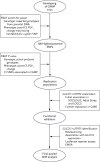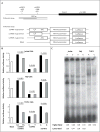Genomewide association between GLCCI1 and response to glucocorticoid therapy in asthma
- PMID: 21991891
- PMCID: PMC3667396
- DOI: 10.1056/NEJMoa0911353
Genomewide association between GLCCI1 and response to glucocorticoid therapy in asthma
Abstract
Background: The response to treatment for asthma is characterized by wide interindividual variability, with a significant number of patients who have no response. We hypothesized that a genomewide association study would reveal novel pharmacogenetic determinants of the response to inhaled glucocorticoids.
Methods: We analyzed a small number of statistically powerful variants selected on the basis of a family-based screening algorithm from among 534,290 single-nucleotide polymorphisms (SNPs) to determine changes in lung function in response to inhaled glucocorticoids. A significant, replicated association was found, and we characterized its functional effects.
Results: We identified a significant pharmacogenetic association at SNP rs37972, replicated in four independent populations totaling 935 persons (P=0.0007), which maps to the glucocorticoid-induced transcript 1 gene (GLCCI1) and is in complete linkage disequilibrium (i.e., perfectly correlated) with rs37973. Both rs37972 and rs37973 are associated with decrements in GLCCI1 expression. In isolated cell systems, the rs37973 variant is associated with significantly decreased luciferase reporter activity. Pooled data from treatment trials indicate reduced lung function in response to inhaled glucocorticoids in subjects with the variant allele (P=0.0007 for pooled data). Overall, the mean (±SE) increase in forced expiratory volume in 1 second in the treated subjects who were homozygous for the mutant rs37973 allele was only about one third of that seen in similarly treated subjects who were homozygous for the wild-type allele (3.2±1.6% vs. 9.4±1.1%), and their risk of a poor response was significantly higher (odds ratio, 2.36; 95% confidence interval, 1.27 to 4.41), with genotype accounting for about 6.6% of overall inhaled glucocorticoid response variability.
Conclusions: A functional GLCCI1 variant is associated with substantial decrements in the response to inhaled glucocorticoids in patients with asthma.
Trial registration: ClinicalTrials.gov NCT00000575.
Figures



Comment in
-
A step toward personalized asthma treatment.N Engl J Med. 2011 Sep 29;365(13):1245-6. doi: 10.1056/NEJMe1102469. Epub 2011 Sep 26. N Engl J Med. 2011. PMID: 21991898 No abstract available.
-
Genetics of glucocorticoids in asthma.N Engl J Med. 2011 Dec 22;365(25):2434-5; author reply 2435-6. doi: 10.1056/NEJMc1112547. N Engl J Med. 2011. PMID: 22187996 No abstract available.
-
Genetics of glucocorticoids in asthma.N Engl J Med. 2011 Dec 22;365(25):2435; author reply 2435-6. doi: 10.1056/NEJMc1112547. N Engl J Med. 2011. PMID: 22187997 No abstract available.
References
-
- Masoli M, Fabian D, Holt S, Beasley R. The global burden of asthma: executive summary of the GINA Dissemination Committee report. Allergy. 2004;59:469–78. - PubMed
-
- Drazen JM, Silverman EK, Lee TH. Heterogeneity of therapeutic responses in asthma. Br Med Bull. 2000;56:1054–70. - PubMed
-
- Szefler SJ, Martin RJ, King TS, et al. Significant variability in response to inhaled corticosteroids for persistent asthma. J Allergy Clin Immunol. 2002;109:410–8. - PubMed
-
- Inglis GC, Ingram MC, Holloway CD, et al. Familial pattern of corticosteroids and their metabolism in adult human subjects — the Scottish Adult Twin Study. J Clin Endocrinol Metab. 1999;84:4132–7. - PubMed
Publication types
MeSH terms
Substances
Associated data
Grants and funding
- K23 HG003983/HG/NHGRI NIH HHS/United States
- M01 RR000079/RR/NCRR NIH HHS/United States
- U01 HL65899/HL/NHLBI NIH HHS/United States
- M01 RR003186/RR/NCRR NIH HHS/United States
- U01 HL51843/HL/NHLBI NIH HHS/United States
- K99 HL105663/HL/NHLBI NIH HHS/United States
- R01 HL092197/HL/NHLBI NIH HHS/United States
- R01 HG003646/HG/NHGRI NIH HHS/United States
- K23 HG3983/HG/NHGRI NIH HHS/United States
- U01 HL51510/HL/NHLBI NIH HHS/United States
- U01 HL51845/HL/NHLBI NIH HHS/United States
- T32 HL07427/HL/NHLBI NIH HHS/United States
- T32 HL007427/HL/NHLBI NIH HHS/United States
- P01 HL083069/HL/NHLBI NIH HHS/United States
- R00 HL096840/HL/NHLBI NIH HHS/United States
- U01 HL065899/HL/NHLBI NIH HHS/United States
- M01 RR00079/RR/NCRR NIH HHS/United States
- U01 HL51831/HL/NHLBI NIH HHS/United States
- U10 HL051843/HL/NHLBI NIH HHS/United States
- U01 HL075419/HL/NHLBI NIH HHS/United States
- U10 HL051831/HL/NHLBI NIH HHS/United States
- U10 HL051845/HL/NHLBI NIH HHS/United States
- U01 HL51834/HL/NHLBI NIH HHS/United States
- U10 HL051834/HL/NHLBI NIH HHS/United States
- M01 RR03186/RR/NCRR NIH HHS/United States
- R01 HL086601/HL/NHLBI NIH HHS/United States
LinkOut - more resources
Full Text Sources
Other Literature Sources
Medical
Molecular Biology Databases
